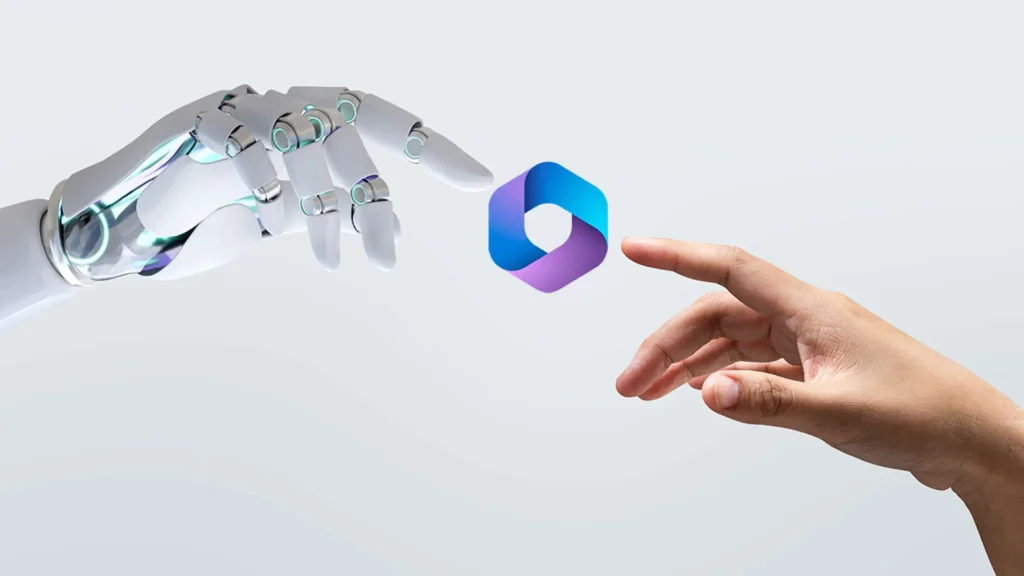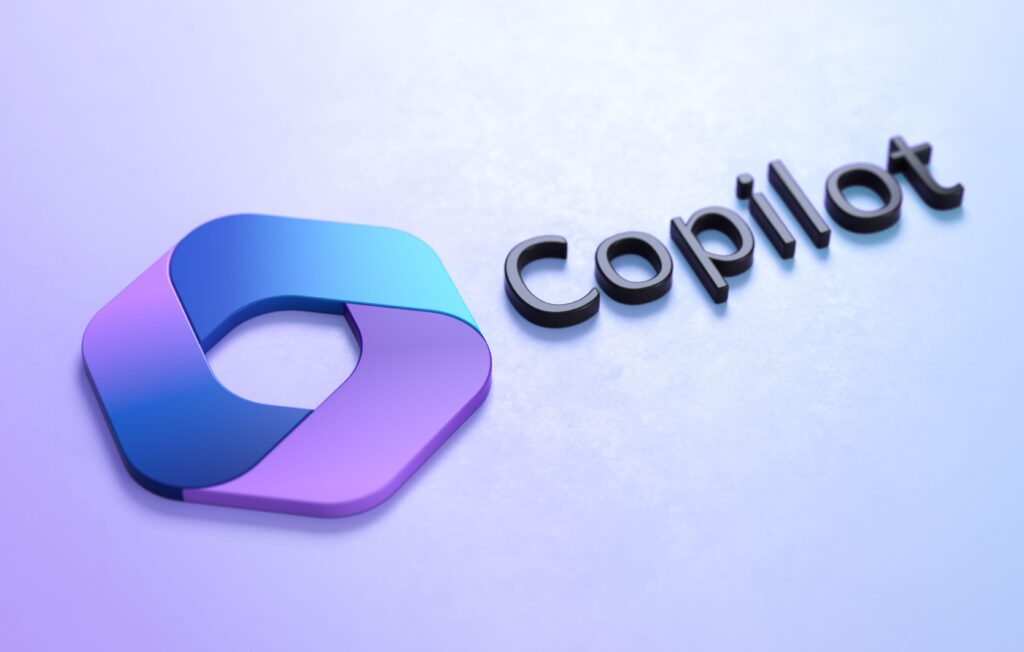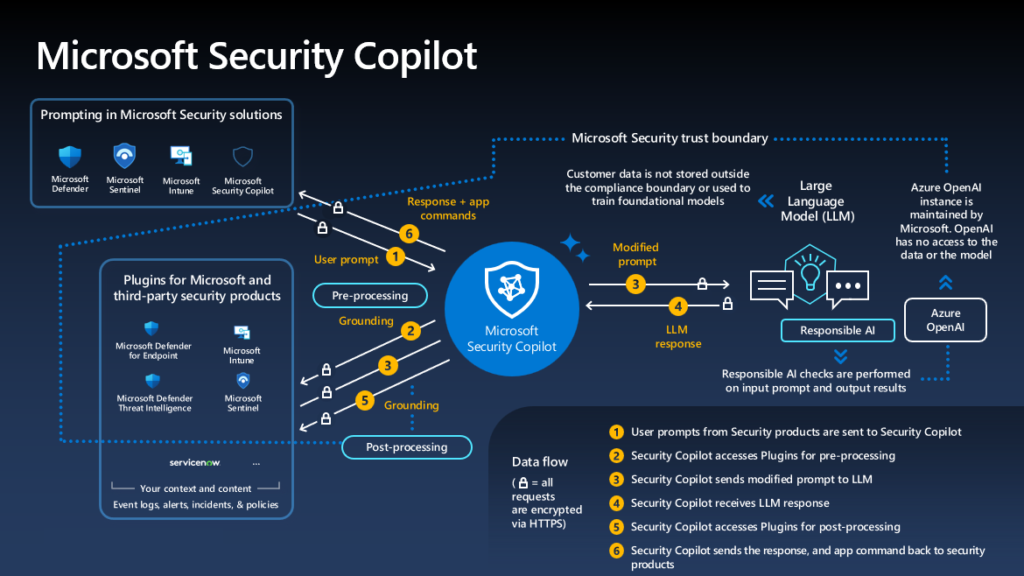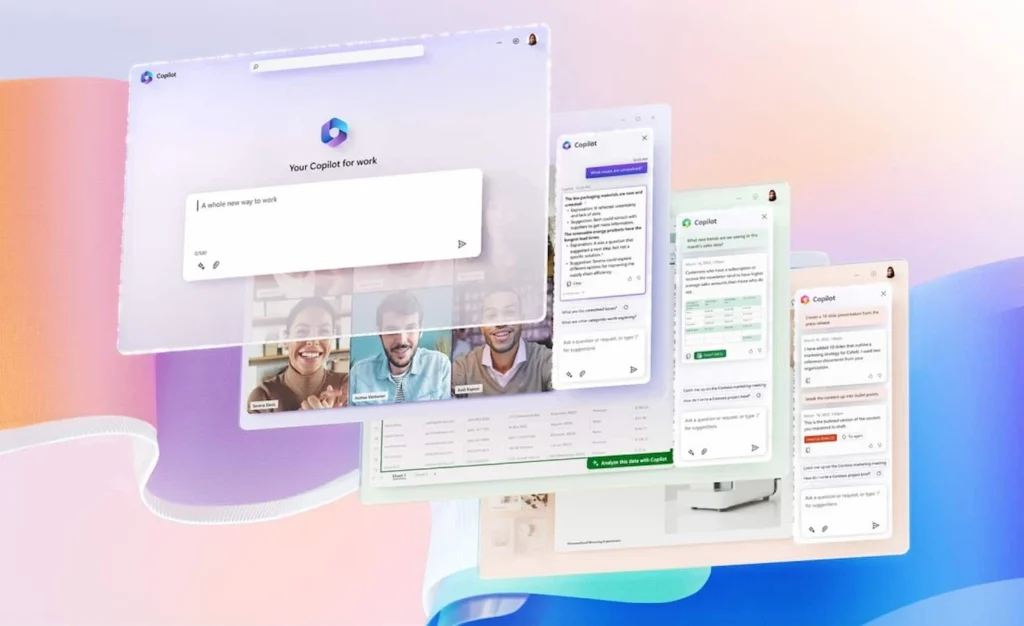In today’s digital age, where cybersecurity threats are a constant concern, what solutions do businesses have to bolster their defences? Microsoft Copilot emerges as a transformative AI-powered assistant, offering a fresh perspective on cyber defence.
Microsoft Copilot, an innovative AI assistant, sets itself apart by seamlessly integrating with Microsoft 365 apps to offer personalized assistance. Its unique feature lies in accessing a user’s Microsoft 365 data, including documents, presentations, emails, calendar events, and contacts. This comprehensive access allows Copilot to provide contextual and relevant suggestions, thereby boosting productivity and efficiency.
While Copilot’s access to sensitive data is a concern, it’s important to understand that Microsoft has implemented robust security and privacy measures to protect user data during Copilot operations. These measures are crucial for any organization considering Copilot, ensuring the safety and privacy of their data.
Main features of Microsoft Copilot Security
Microsoft Copilot stands as a pinnacle of innovation in cybersecurity, weaving together advanced artificial intelligence and machine learning capabilities to offer a comprehensive and proactive defence mechanism against cyber threats. By meticulously analyzing vast datasets, Copilot identifies and neutralizes potential threats before they can manifest, ensuring that organizations maintain a step ahead in safeguarding their digital assets. This forward-thinking approach is complemented by swift incident response tools and strategies that mitigate the impact of security breaches. In contrast, integrated security insights and reporting mechanisms offer deep dives into the security health of an organization.
By seamlessly integrating with the broader Microsoft ecosystem, Copilot enhances an organization’s security posture. It does this by uncovering hidden patterns in data, thereby hardening defences against a spectrum of cyber threats. The platform’s ability to provide actionable insights in real-time drastically reduces response times to threat events, covering a wide range of potential attack vectors by leveraging data from various security tools across network and cloud platforms. Beyond bolstering security measures, Copilot introduces significant cost savings by automating numerous security processes, allowing teams to redirect their focus towards strategic initiatives. This blend of advanced analytics, comprehensive threat coverage, and integration capabilities positionsas an indispensable ally in an organization’s quest to fortify its cybersecurity defences.


How it handles data
Microsoft Copilot uses a variety of data sources to provide personalized assistance to users. These data sources include user activity data, such as emails, calendar events, and documents, as well as contextual data, such as user location and device information. Copilot also uses machine learning models to analyze user data and provide relevant suggestions and insights. And, of course, as with any technology that handles sensitive data, understanding the security and privacy implications of using it is crucial. Therefore, Microsoft has implemented several security and privacy measures to protect user data during Copilot operations.
Microsoft employs data encryption to safeguard user data both during transmission and while it is stored, effectively shielding it from unauthorized access. In addition to encryption, Microsoft implements access controls to guarantee that only authorized individuals have access to user data. The company has also established data retention policies, ensuring user data is retained only for the necessary period. Furthermore, Microsoft is committed to transparency regarding its data security and privacy practices, offering users detailed information on how their data is utilized and protected.
Strategies to ensure data security
While Microsoft has implemented several security and privacy measures to protect user data during Copilot operations, there are additional steps that businesses can take to enhance data security:
User education: Businesses should educate their employees about the importance of data security and privacy and provide training on using Copilot safely and securely.
Access controls: Also companies should implement access controls to ensure that only authorized users can access user data.
Data encryption: Businesses should also encrypt user data both in transit and at rest to protect it from unauthorized access.
Data retention policies: Another essential tip is establishing data retention policies to ensure user data is only retained for as long as necessary.
Regular audits: Last but not least, companies should conduct regular audits of their data security and privacy practices to ensure compliance with industry standards and regulations.


Microsoft Security Copilot vs. Microsoft 365 Copilot
Microsoft Security Copilot and Microsoft 365 Copilot, two powerful AI-driven tools developed by Microsoft, offer unique benefits to bolster different aspects of organizational operations. Security Copilot, for instance, is designed to enhance security measures, equipping organizations with advanced tools to fortify their cybersecurity posture against increasingly sophisticated threats. On the other hand, Microsoft 365 Copilot is a productivity powerhouse, aiming to streamline workflows and enhance efficiency across a variety of applications.
In the rapidly evolving digital landscape, where cybersecurity threats are a constant, it’s crucial for organizations to understand and deploy tools like it. To effectively integrate it into their systems, businesses should first evaluate their current data security stance, educate their workforce on best practices for data security, and adopt Copilot. This will significantly boost their cybersecurity measures and safeguard sensitive information. As AI technology progresses, the role of solutions like Microsoft Copilot in ensuring the security and productivity of businesses becomes increasingly crucial, marking a new era in cybersecurity driven by AI. The future of cybersecurity is here, and it’s powered by AI.



